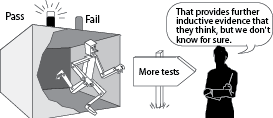Can inductive evidence determine this?
Is the test—as a source of inductive evidence—a legitimate test of intelligence? Such evidence may be weak or strong, but never deductively certain. A claim that a system thinks based on its passing the test is open to further evidence and revision.

James Moor, 1976 & 1987.